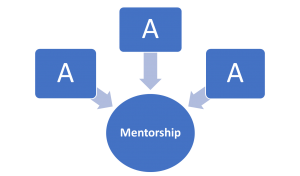 According to a CNB/SurveyMonkey “Happiness Workplace Survey,” about half of workers say they have a mentor at work and having that mentor leads to a higher level of happiness in the workplace. In fact, a whopping 91% of workers who have mentors reported feeling “satisfied” with their jobs. And for those who don’t have a mentor? The numbers drop by double digits.
According to a CNB/SurveyMonkey “Happiness Workplace Survey,” about half of workers say they have a mentor at work and having that mentor leads to a higher level of happiness in the workplace. In fact, a whopping 91% of workers who have mentors reported feeling “satisfied” with their jobs. And for those who don’t have a mentor? The numbers drop by double digits.
There’s no doubt that mentorship is a powerful tool. But what are some of the traits that make a great mentor? In our last article, we looked at how a strong mentorship program can benefit an organization. Now, let’s take a deeper look at what’s involved in the mentorship process and some of the fundamentals. That starts with the three “A”s: active listening, availability and analysis.
Here’s a closer look at each:
Active Listening
Strong mentors knows when to stop talking and really listen to what the mentee is saying. They understand how to guide the conversation by asking open-ended, exploratory questions. They also offer quality feedback and often refrain from offering solutions or advice, allowing the mentee to come to their own conclusions and decisions.
Availability
Effective mentors make themselves available through both physical availability and emotional availability. Physical availability refers to scheduled sessions where the mentor offers their full attention and concentration. Emotional availability doesn’t mean a shoulder to cry on, but rather the feeling of care and investment that the mentor puts out (body language, active listening, professional conduct, etc).
Analysis
Effective mentors understand the importance of answering questions and concerns honestly and with diplomacy. In short, they don’t beat around the bush. They know how to help mentees see issues from a different perspective, even if it’s not what they want to hear. That’s why it’s so vital that mentors be up-to-date on current issues and concerns within their industry and know how to modify their analysis based on the latest data.
A great mentor should have a mentees best interest at heart and be able to give quality time and attention to the process. It’s can be a challenging role, but with the right investment and training, a mentor can go from so-so to exceptional. That’s where coaching can be an invaluable asset. Leah M Joppy and Associates can work with you to build a mentorship program within your organization that will not only increase job satisfaction, but will help cultivate a pool of future leaders. Call us at 301-670-0051 or email leah@lmja.com to learn how we can help.